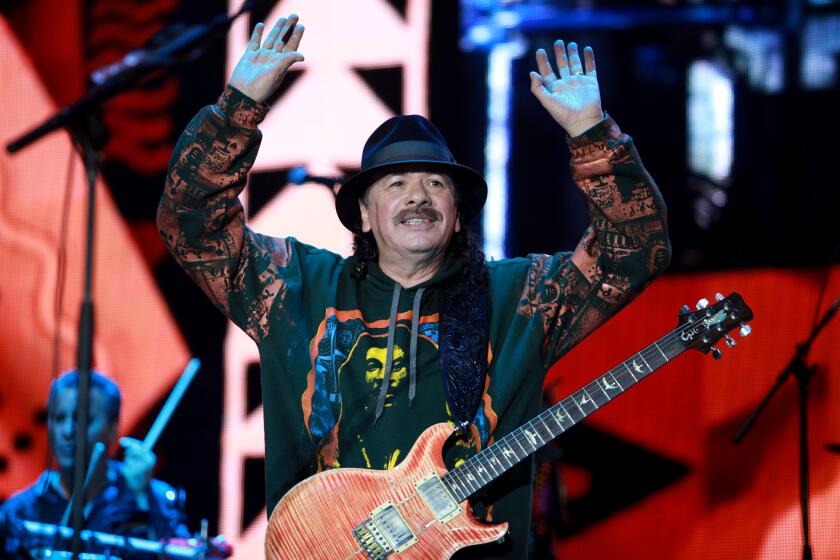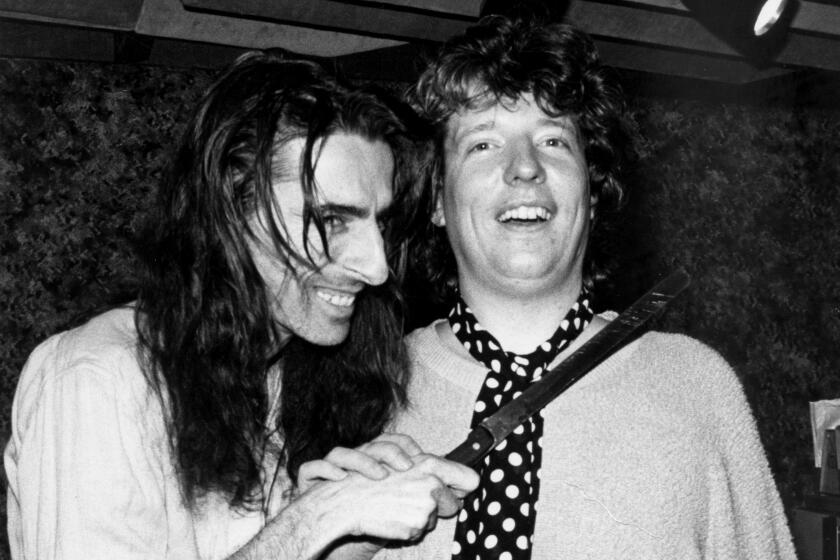The Dude really rocks: Jeff Bridges leans into raw truth of his music on the old/new songs of ‘Slow Magic’

- Share via
With his extraordinary acting prowess, it’s no surprise that Jeff Bridges made “the Dude” as iconic as the greatest rock stars. However, most fans of “The Big Lebowski” probably aren’t aware that Bridges is a real rocker in his own right, a gifted singer-songwriter who plays both guitar and piano. Beyond his acclaimed performances in classic films like “Starman” and “The Last Picture Show,” cult hits like “The Fisher King” and his unforgettable turn in “Crazy Heart,” the legendary actor boasts a music résumé that rivals most full-time musicians’.
Bridges released his debut album, “Be Here Soon,” in 2000. He also co-produced the record with Chris Pelonis and the Doobie Brothers’ Michael McDonald, who sang guest vocals, along with David Crosby. His 2011 self-titled follow-up album, produced by T Bone Burnett, made waves, landing on the Billboard 200 as well as country, folk and rock charts. Ahead of the album’s release, Bridges performed at the Troubadour, where he was introduced onstage by Quincy Jones, who told the star-studded crowd (Jackson Browne among them) that music is Bridges’ “true calling.” Bridges even has his own signature models of Breedlove guitars.
Now, Bridges is poised to release “Slow Magic, 1977-1978,” his first record since his 2015 spoken-word/ambient album, “Sleeping Tapes.” The 10-year gap between records might seem like a long time, but these songs actually have been waiting almost 50 years to make their debut. “Time is so bizarre. I can’t believe we recorded this half a century ago,” Bridges, 75, says during a Zoom call, wearing a brown cable-knit sweater, with his reading glasses perched on his nose, and sporting a bushy white beard.
Sitting in his garage-turned-ceramics studio that doubles as a jam space, at his home in Santa Barbara, surrounded by framed photos, artwork and various mementos, including a “The Big Lebowski”-themed bandanna, Bridges seems just as incredulous that “Slow Magic” is even coming out. He explains that the journey to release it was rather unexpected. He credits Keefus Ciancia, his “Sleeping Tapes” collaborator, for the record making its long-overdue public debut. Bridges had played the decades-old cassette of his songs for Ciancia, who, without Bridges’ knowledge, passed it along to Matt Sullivan, founder of indie label Light in the Attic, who was eager to release it. Bridges was stunned but delighted.
For fans of Bridges’ films, “Slow Magic” is a rare treat, offering a glimpse into a more personal side of his life that was previously hidden from the public eye. In his 20s, as his big-screen career was taking off — with two Oscar nominations, for “The Last Picture Show” and “Thunderbolt and Lightfoot,” already under his belt — Bridges would join a group of his high school friends for weekly nighttime jam sessions. Keeping the vibe loose and spontaneous, they drank whiskey and improvised instrumentals. “Occasionally we’d spout words,” Bridges recalls. “And people who didn’t play a particular instrument were encouraged to play that instrument.”
And, man, were they high. How high? “Pretty damn high,” Bridges says, laughing, recalling late-nights fueled by pot, quaaludes, cocaine and psychedelics. After all, he notes, it was the ’70s, a time of experimentation.
Inspired by these sessions, Bridges would write songs on his own, recording them between film shoots. To co-produce the tracks, he enlisted Ken Lauber, who had arranged and composed the music for 1975 film “Hearts of the West,” in which Bridges starred. It’s rumored that Lauber, who also had worked with Bob Dylan and the Band, contemplated the latter to back Bridges on the recordings, but instead chose Bridges’ crew of jammers due to their unique, irreplaceable chemistry.

Clocking in at approximately 40 minutes, “Slow Magic” offers an eclectic ride, reflecting Bridges’ diverse influences — spanning from Captain Beefheart and Motown to the Beatles, Moondog, the Rolling Stones and Dylan. The lead single, the self-satirizing “Obnoxious,” released in February, finds Bridges singing hilariously about self-indulgence, eating and drinking excessively, and popping pills. The album also features a pair of atmospheric instrumentals, “Space 1” and “Space 2,” co-written by the jammers.
The album’s highlights include the soulful, sax-infused title track, “Slow Magic”; the Band-esque “This Is the One,” a blissful love song Bridges wrote about his wife, Susan; and the upbeat, radio-friendly “You Could Be Ready.”
The record closes with the epic eight-minute “Kong,” which Bridges wrote after director John Guillermin rejected his idea for an alternate ending to the 1976 “King Kong” remake, in which Bridges starred. In his version, the giant monkey turns out to be a machine. The song features the disco-inspired chorus “Do the King Kong, baby,” with actor Burgess Meredith simulating the historic Hindenburg disaster radio broadcast as he narrates the massive ape-machine’s fiery crash to the ground.
The bananas track was detailed in Rolling Stone in 1977, when Bridges graced the magazine’s cover to promote the sci-fi fantasy blockbuster. Titled “What Is Jeff Bridges Afraid of?,” the article chronicles his relentless self-doubt and anxiety, which Bridges confesses still plague him to this day.
It’s an admission that seems curiously at odds with his laid-back demeanor, though. “I think maybe what you’re seeing these days is a version where I’ve covered a lot of that up. All of those fears are still going on, but I polish that s— out,” Bridges says. “I don’t think I’ve changed much. I feel about the same.”
While he acknowledges his “pretty good reputation of being well-liked,” he reveals, “Liking myself, having understanding, affection and empathy for myself — that’s what I could use some work on.”
What’s more, he shares that as an actor he’s imprisoned by his perfectionism, which he describes as “a self-imposed hell.” “Creatively, the sweet spot comes from getting out of the way and letting things come through you,” he says. “And my anxiety comes from feeling that I‘ve got to do it ‘just right,’ but I don’t know if I have the goods to come up with … so that’s what I struggle with.”
To illustrate his point, he references “The Big Lebowski.” “‘Sometimes you eat the bar and sometimes the bar, well, he eats you,’” Bridges says, laughing as he delivers the famous line just like actor Sam Elliott in the film, his Southern drawl turning “bear” into “bar.”
It’s humor that helps to alleviate his anxiety, he says, which includes laughing at himself “for being so ridiculous about it all.” What’s more, Bridges expresses gratitude for his wife’s frequent reminders to lighten up and have fun. “And then it’s like, oh yeah, I forgot — joy. The miracle is available. It’s right there, going on all the time,” he says.
It’s miraculous that Bridges is even alive. In 2020, he was diagnosed with non-Hodgkin lymphoma. Meanwhile, as he battled cancer, he contracted COVID, which, he says, left him “on death’s doorstep.” In remission since 2021, he says his latest CT scan showed no trace of the cancer, making it especially poignant that Bridges is currently learning to play Leonard Cohen’s “Waiting for the Miracle” on guitar.

Self-taught on the instrument, which he first picked up at 14, Bridges began writing songs soon after. When Bridges was 20, Quincy Jones put his song “Lost in Space” in the 1969 film “John and Mary,” starring Dustin Hoffman and Mia Farrow.
Bridges calls it an “amazingly cool” moment. Still, he says he didn’t fantasize about becoming a professional musician. Passionate about ceramics, painting, photography and music, he reveals that he was never particularly career-driven. “I’ve never really been an ambitious person. I never had that kind of drive,” he says.
Even acting was not initially a goal for Bridges, who admits he feared the scrutiny of following in the footsteps of his famous father, Lloyd, who was best known for starring in the TV series “Sea Hunt.” “I had a desire to share what I had to offer, but I didn’t want to be labeled … what do they call it? ... ‘Nepo baby,’” Bridges says. “I could understand why people would resent that, and I didn’t want to be resented.”
Nonetheless, his father encouraged him to pursue acting, pointing out that it would bridge his various interests, allowing him to play a musician in a film someday.
Truer words were never spoken. In 1989, Bridges starred in the critically lauded “The Fabulous Baker Boys” alongside his older brother, Beau, as a waning lounge act duo of piano-playing siblings who hire a talented, beautiful singer, played by Michelle Pfeiffer, to revitalize their act.
After his success in “The Fabulous Baker Boys,” Bridges took a sharp turn in 2005 with his next musician character, embracing a darker role in “Tideland,” portraying an electric guitar-toting, drug-addled failed rock star in Terry Gilliam’s surreal tale.
But it was his captivating, starring turn as chainsmoking, alcoholic, washed-up country star Otis “Bad” Blake in the heart-stirring, redemptive “Crazy Heart” several years later that earned him Oscar gold, as well as a Golden Globe, Screen Actors Guild Award and an Independent Spirit Award.
Ironically, Bridges initially passed on the part. It felt too risky to play a role so personal to him. “Subconsciously, I think I was turning it down because playing something that was so dear to my heart … exploring my [kind of] music and stuff … if you keep it in the dream world, you’re safe,” he says. “But when it becomes real, you know you could easily fail, and all of your dreams could be shattered.”
The turning point came when Bridges ran into Burnett, who was set to oversee the film’s music, and encouraged him to take the role. “I thought, ‘Wow, this is too cool of an invitation,’” Bridges reflects. “So, I said, ‘F— it. I’m just gonna do it.’”
It was music to the ears of “Crazy Heart” director Scott Cooper. “Jeff changed my life by saying yes to a screenplay that I wrote specifically for him,” Cooper, who made his directorial debut with the film, tells The Times. “I was somewhat besieged by other actors to play the part — all of whom are great actors and movie stars — but which actor can portray an incredibly flawed character, make us see ourselves in that character and, in the end, uplift us? For me, it was only Jeff Bridges.”
Even when Bridges isn’t playing a musician, his cinematic path often intersects with music, whether it’s his cover of Johnny Cash’s “Ring of Fire” with Kim Carnes that plays over the opening scene of “The Contender” or his role in “Masked and Anonymous,” acting alongside his longtime musical hero, Dylan, who co-wrote the 2003 film.

Bridges recalls a particularly surreal moment when the music icon came knock-knock-knockin’ on his trailer door, guitar in hand, for an impromptu jam. Initially trembling with nerves, Bridges says he felt increasingly at ease playing music with Dylan, finding him to be disarmingly down to earth.
“It’s a great blessing to just be alive with that guy,” he says. “It’s like being alive during Shakespeare’s time.”
Bridges has crossed professional paths more than once with Dylan, whose song “The Man in Me” plays during the opening titles of “The Big Lebowski” and a later scene as well.
Soon, Bridges will host a series of “The Big Lebowski” screenings on the West Coast. “They’ll show the movie, and then I’ll do a talk and show my experience through the photographs that I took during [the making of] it,” he says.
In the meantime, as he contemplates what’s next after the cancellation of his TV series “The Old Man,” Bridges says “Slow Magic” has reignited his desire to make music. He’s thinking about getting in touch with “Kenny Lauber and some of the old guys” to reunite the group. As Bridges tells it, playing with a band allows him to act out his long-standing “Beatles fantasy,” and remains one of his most rewarding roles.
More to Read
The biggest entertainment stories
Get our big stories about Hollywood, film, television, music, arts, culture and more right in your inbox as soon as they publish.
You may occasionally receive promotional content from the Los Angeles Times.












